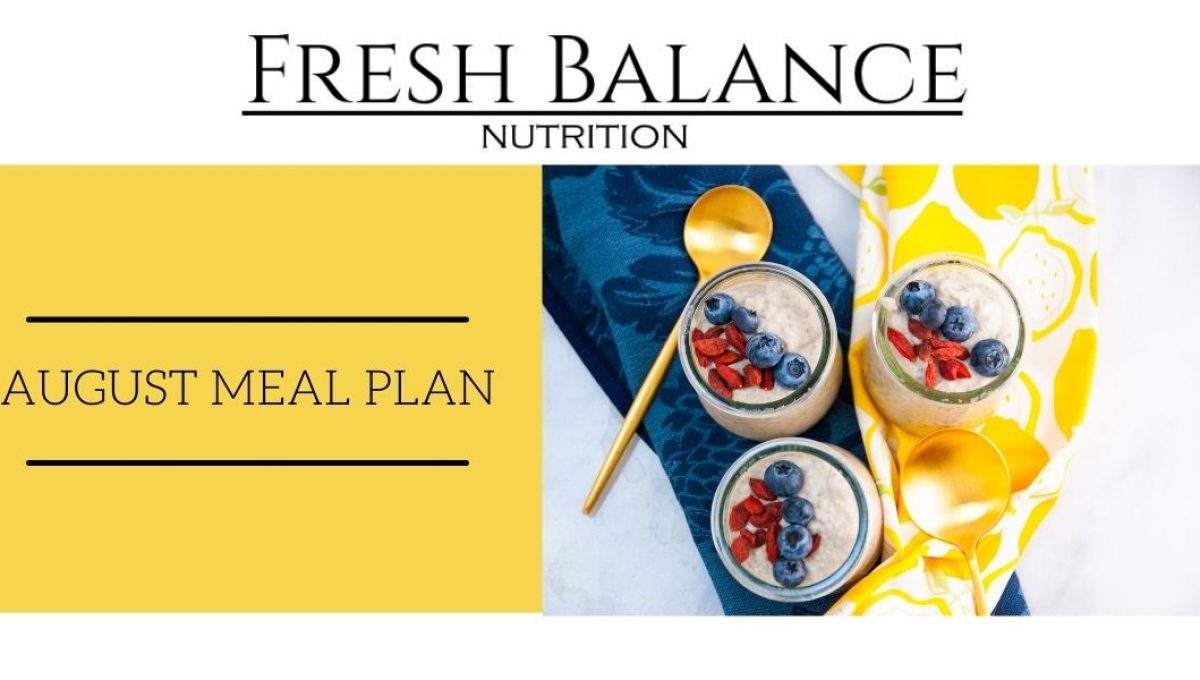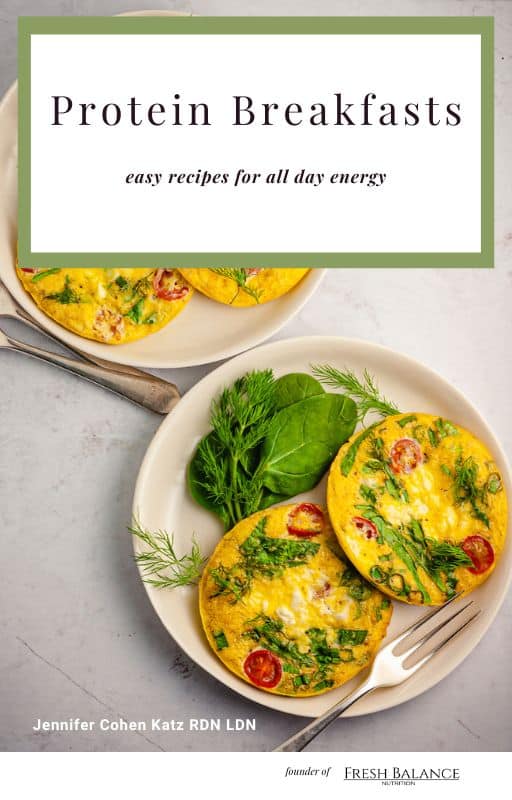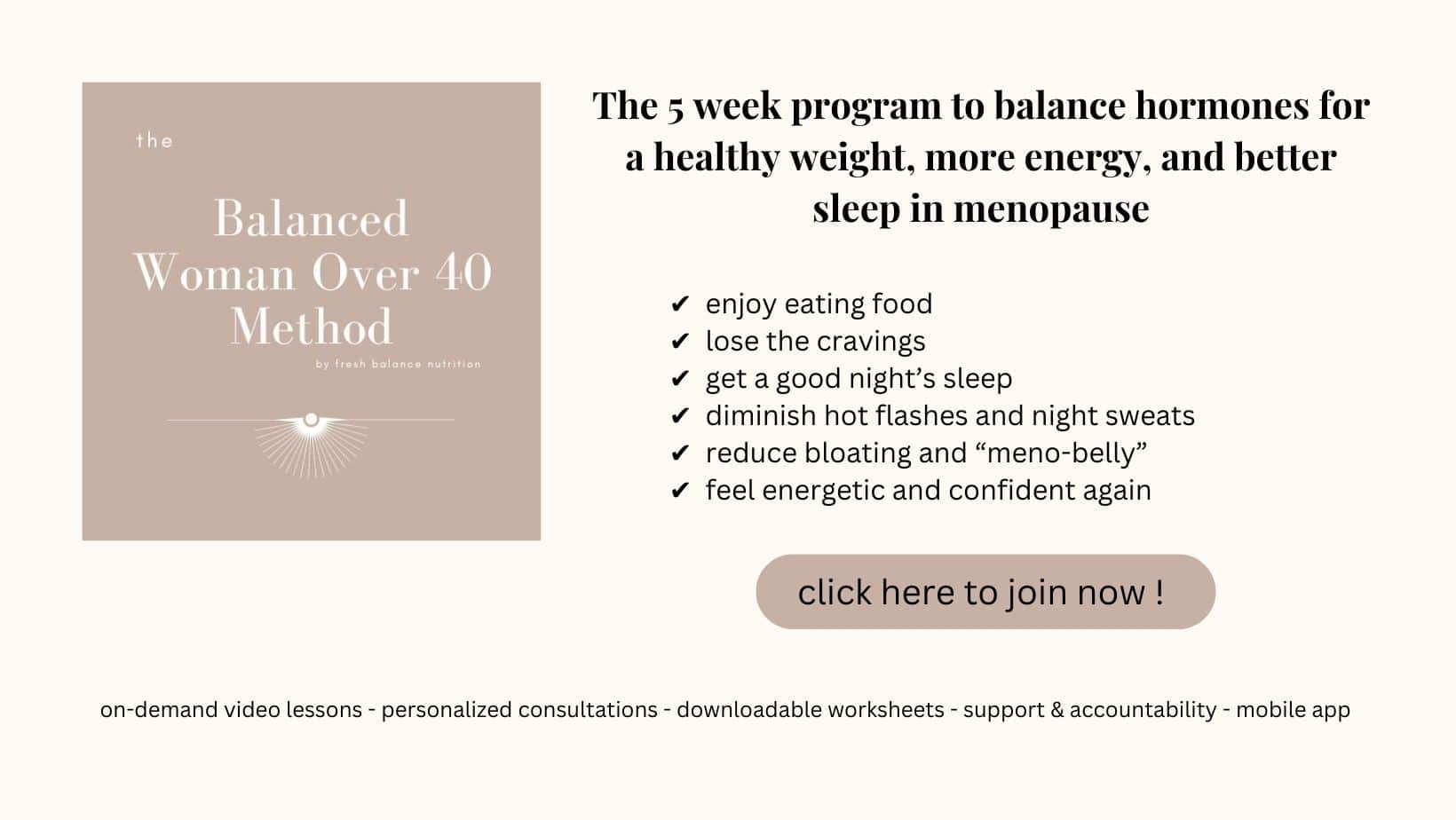Let’s take a look at how much fiber we can get from eating lots of plant foods.
When we plan meals with a focus on plants we get all the health benefits of anti-inflammatory foods. These foods are associated with decreased perimenopausal symptoms, enjoying a healthy weight, slowing signs of aging, and decreased risk of diseases common in menopause.


What is a “plant-based diet”?
Eating plant-based doesn’t necessarily mean you don’t eat meat or seafood. It just means you choose to fill most of your plate with a variety of vegetables, fruit, beans, whole grains, nuts, seeds, and maybe soy foods. At least ¾’s of the plate should be filled with plant foods.
Red meat, poultry, eggs, fish, and seafood are excellent sources of protein and you can certainly fit them into a healthy meal plan to meet your protein needs. Simply complement that animal protein with an abundance of fiber and nutrient-packed plants to balance your plate.
How can a plant-based diet help me in perimenopause?
Plants – it’s where a lot of the good anti-inflammatory fats and oils are. Nuts, seeds, avocados, olives, olive oil, flax, and chia seeds are full of healthy monounsaturated fats and omega-3 fatty acids. These can help to improve cholesterol levels, support brain health, and decrease risk of heart disease.
Have you noticed vegetables and fruits come in a rainbow of colors? Those reds, greens, yellows, and purples tell us these foods contain plant compounds that reduce perimenopause symptoms and decrease our risk of disease. The lycopene in watermelon can keep your heart healthy. Green broccoli, a cruciferous vegetable, clears the excess bad estrogen that is associated with breast cancer. The flavinoids in berries and acai support brain health.
Plants contain the fiber that meat and dairy foods do not. I like to have my clients aim for 35+ grams of fiber each day. Getting enough fiber can help us reach and maintain a healthy weight in perimenopause and beyond. Plant fiber can also help control hot flashes and night sweats. Those good bugs in your gut feed on fiber and help keep things running smoothly in your digestive system.
Do I get any protein from plants?
Yes, many plant foods contain protein. Some have more than others. If you are a vegetarian or vegan or just want to try eating more protein from plants, there is a wide variety of plant proteins to choose from.
- Lentils, peas, and beans
- Tofu, tempeh, and edamame
- Nuts and seeds
- Plant protein powders like pea, hemp, rice
All of these plant proteins help to manage blood sugar which is so important for hormone regulation and reducing symptoms like hot flashes.
Should I avoid soy foods?
There’s no need to avoid soy. Soy helps to decrease symptoms of perimenopause because it acts as a weak phytoestrogen in our body. It can also reduce cholesterol and decrease breast cancer risk. Soy is very beneficial for keeping our bones strong.
Choose minimally processed sources of soy like tofu, tempeh, and edamame. Tempeh is a fermented food so it offers a bonus health advantage. It’s a great source of both probiotics and prebiotics to keep your gut happy and support good digestion.
I’ve included even more information about the benefits of soy along with my recipe for Baked Teriyaki Tofu.
Enjoy this perimenopause meal plan for august, full of plant protein, fiber, and plant compounds to support a healthy perimenopause. If you’d like to try another recipe for veggie burgers try Quinoa Vegetable Meatballs. Just prepare the recipe and shape into patties to bake and serve on a whole grain roll or wrapped in some leafy greens.
This post contains affiliate links for products I use and trust. I may receive commissions on purchases at no cost to you. As an Amazon associate I earn from qualifying purchases.








